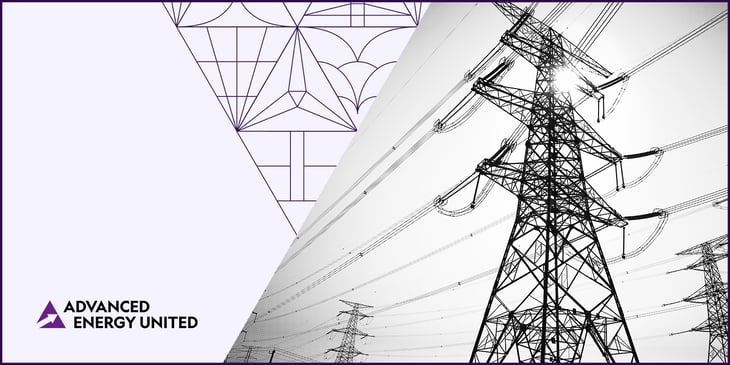Utility Dive reports on the Department of Interior's filing which revokes the approved construction and operation plan for US Wind's 2.2 GW Maryland Offshore Wind project. United's Kat Burnham discussed how this decision fits into the big picture following the recent stop-work order at Revolution Wind in Rhode Island, warning that the disruption to long-planned energy projects puts billions of dollars in private investment and thousands of jobs at risk.
Diana DiGangi
Recent Posts
Utility Dive: Trump Administration to Revoke Approval for 2.2-GW Maryland Offshore Wind
Topics: United In The News, Kat Burnham, Offshore Wind, Maryland
Utility Dive: New York Launches 1 GW Bulk Energy Storage Solicitation Using New Credit
Utility Dive reports that New York has launched its first-ever bulk energy storage solicitation, seeking proposals to procure 1 GW of utility-scale battery storage. United's Kristina Persaud commended New York's commitment to its clean energy goals amid federal rollbacks, while United's Shawn Kelly highlighted new opportunities for advanced energy projects to thrive in states and regions across the country.
Topics: United In The News, Kristina Persaud, Shawn Kelly, Battery Storage
Utility Dive: Trump Seeks Tighter Restrictions on Wind and Solar with Executive Order
Utility Dive reports on President Trump's executive order directing the Treasury and Interior Departments to tighten definitions around the "beginning of construction" for qualifying wind and solar projects seeking 45Y and 48E tax credits. United's Harry Godfrey stated that the combined impacts of restrictive construction thresholds and Foreign Entity of Concern (FEOC) rules may significantly reduce job growth, stall advanced energy projects, and dissuade private investment across the country.
Topics: United In The News, Harrison Godfrey, Offshore Wind, Solar, Federal Priorities
Utility Dive: Senate Finance Committee Reduces House IRA Cuts, But Few Changes for Wind and Solar
Utility Dive covers the Senate Finance Committee’s draft budget bill, with United Managing Director Harry Godfrey warning that proposed clean energy tax credit cuts could stall industry growth and jeopardize U.S. manufacturing momentum.
Topics: United In The News, Federal Priorities
Utility Dive: IRA’s Fate Unclear as Republicans Look to Finance Megabill
Utility Dive reports that the Inflation Reduction Act (IRA) is likely to be targeted for cuts as Congress aims to cut spending by $2 trillion. United's Harry Godfrey emphasized that tax credits included in the IRA are critical to building U.S. energy dominance, creating good-paying jobs, and boosting economic development.
Topics: United In The News, Harrison Godfrey, Federal Priorities
Utility Dive: 2025 Renewable Energy Outlook - Full Speed Ahead as Second Trump Administration Begins
Utility Dive discusses the outlook of the renewable energy sector in 2025, addressing both the positive trends and potential challenges the industry may face under a second Trump presidency. United's President and CEO Heather O'Neill offered key insights into the current and future state of advanced energy, highlighting the scale of investment and growth that the industry has experienced over the years.
Topics: United In The News, Heather O'Neill
Utility Dive: What do Trump’s Picks to Head Energy and Interior Signal for Renewables?
Following President-Elect Trump’s nominations for U.S. Department of Interior and Secretary of Energy, United’s Harry Godfrey told Utility Dive that the hope is that industrial policy that prioritizes domestic manufacturing will resonate with bipartisan audiences.
Topics: United In The News, Harrison Godfrey, Federal Priorities
Utility Dive: What Trump’s Reelection Could Mean for the IRA, Offshore Wind
Utility Dive examines the expected impact of a second Trump presidential term on the future of the Inflation Reduction Act and offshore wind projects. United's Harry Godfrey predicted initiatives under the new administration are unlikely to significantly hinder the growth of renewable energy, highlighting that the ongoing clean energy transition has the potential to lower consumer energy bills and help reduce inflation in the long term.
Topics: United In The News, Economic Impact, Harrison Godfrey, Offshore Wind, Federal Priorities
Utility Dive: Future of IRA, Shape of Permitting Reform Hinge on Upcoming Election, Experts Say
Utility Dive interviews several experts, including United's Harry Godfrey, on how the results of the November 2024 election could shape the future of the Inflation Reduction Act (IRA), permitting reform, and transportation electrification.
Topics: United In The News, Harrison Godfrey, Permitting and Siting, Federal Priorities
Utility Dive: Moody’s warns of potential power price volatility from renewables oversupply
Reliability costs associated with backstopping renewables could rise to $435 billion a year around the world by 2030, the company said in a report released Wednesday.
As utilities increase the amount of renewable energy in their fuel supply mixes, the associated need for an increase in resource buffers could lead to oversupply that would increase power price volatility and grid reliability costs, said Moody’s Investors Service in a Wednesday report.“Because wind and solar power generation depends on weather conditions and is thus not dispatchable, load-serving utilities will likely build in a cushion of supply to enhance reliability and compensate for resource volatility,” the report says.
Topics: Wholesale Markets, United In The News, Ryan Katofsky





